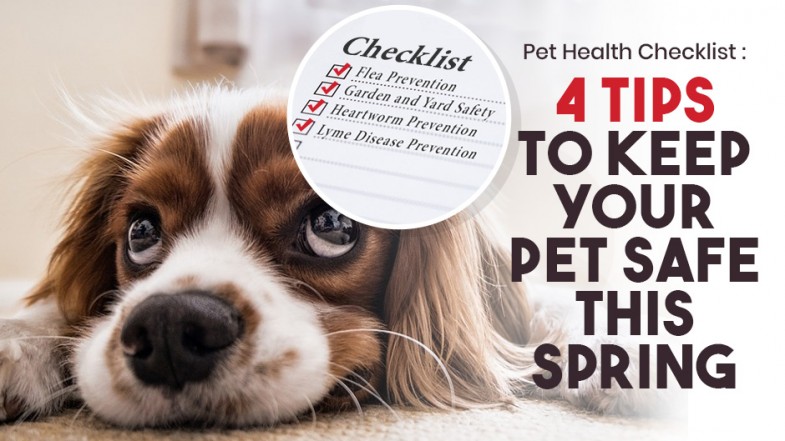Pet Health Updates and News
Pet Health Checklist: 4 Tips to Keep Your Pet Safe This Spring

Our recent winter is one we're looking forward to leaving behind, and it officially ends this month. As you look forward to spring, the Ellis and Bellinger team encourages you to take a few minutes to consider seasonal hazards from your pet’s perspective. By taking the time to pet-proof your home and yard, as well as being proactive with parasite prevention, you and your pet can fully enjoy the season together!
Fleas - An "Ick" to Avoid
As the weather gets warmer and you spend more time outdoors with your pet, keep in mind that the flea population increases with the warm weather. Since fleas require a living host for survival, your dog or cat is an easy target. Fleas tend to attach themselves to your pet’s ears, underbelly, tail, and paws. Common indications of fleas include excessive itching, bleeding or oozing skin, biting, chewing, and licking at the skin. Additionally, you may notice "black pepper" appearing specks, which may be "flea dirt". It’s essential to ensure your pet is protected from the misery of fleas and a possible severe allergic reaction to flea saliva.
Garden and Yard Poisons
There’s nothing like looking at a brown or snow-covered lawn for months to get you excited about working on your yard! Before you do, remember that mulch, fertilizers, insecticides, and herbicides can all be toxic if your cat or dog ingests even a little bit. We recommend keeping your pet in the house or a kennel when you’re working on the yard. Curious pets may be inquisitive about newly appearing smells and objects. Be sure that you read and follow the directions exactly as stated on any yard product labels. When not in use, keep products in a sealed container well out of your pet’s reach.
Heartworm Prevention
When a mosquito infected with heartworm bites your pet, the parasite transfers to her body. It lodges within the chambers of the heart and in the lungs, which may eventually make it impossible for your pet to breathe. A single heartworm can grow to a size of 12 inches inside of your pet’s body. Heartworm also reproduce rapidly, making it very challenging to treat an advanced infestation. With the potential for something this deadly, please be certain that your pet has heartworm protection. If you haven't already, make your pet's preventive care visit so we can test for heartworm infection, and get your pet on a protocol to keep her safe.
Ticks and Lyme Disease
Lyme disease is one of the most serious tick-borne illnesses that your pet can receive from a single tick bite. The most common symptoms of Lyme disease include skin infections, arthritis, lethargy, and fever. Unfortunately, the disease can progress and turn fatal.
Besides equipping your pet with tick protection, it’s important to check his body for ticks each time he comes in from outside. Prompt removal is critical since infection from a tick typically doesn’t start to spread for 48 hours. Use a pair of tweezers to pull the tick off your pet in a straight line. Avoid twisting the body of the tick since this could cause parts of its body to break off and remain lodged in your pet.
These are just some of the potential pet hazards to be aware of this spring. Please contact us at 405-275-6498 with additional questions or shop in our online store for flea, tick, and heartworm prevention products.
Image source: Pixabay